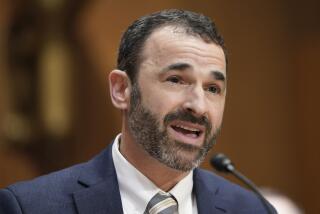Toughened Laws on Way, Executives Are Warned : Crime: Under recommendations to be made to Congress, corporations could face much stiffer fines for felonies committed by their employees.
NEWPORT BEACH — The former regional administrator of the Securities and Exchange Commission in Los Angeles and a federal prosecutor in the ZZZZ Best fraud case warned Orange County executives Thursday about a new crackdown on white-collar crime coming this November.
The U.S. Sentencing Commission, an independent agent of the judiciary, recommended last month to Congress a series of new punishments for corporations convicted of felonies ranging from fraud to money laundering. The recommendations are expected to become law Nov. 1.
“It’s going to make it a completely different world for corporations,” said James L. Sanders, who resigned from the SEC in April. Sanders made his remarks at a luncheon in Newport Beach.
Under the new guidelines, corporations convicted of a crime based on the actions of their employees--be they low-level administrators or top executives--will face stiff fines.
To avoid severe fines, companies would have to show that they had a compliance program in place aimed at deterring white-collar crime and that they had cooperated fully with federal investigators.
For instance, a $1-million fraud in which senior management was not involved could cost a company between $1 million and $2 million in fines under the new guidelines. But if the company had a crime-deterrence program and a policy of cooperation, the fine would range from only $50,000 to $200,000.
Legal experts say the new guidelines will probably result in fines in the hundreds of millions of dollars.
“There is a real monetary benefit for a corporation to have in place today some internal compliance program,” Sanders said.
Gordon A. Greenberg, a federal prosecutor in the ZZZZ Best securities fraud case, advised publicly traded companies to pay close attention to the new law in order to protect themselves from possible shareholder litigation.
“Shareholders might say you cost the corporation $40 million when you could have cooperated,” Greenberg said. “You are now guilty of gross mismanagement.”
Greenberg is best-known for prosecuting Barry Minkow, the flamboyant one-time owner of ZZZZ Best Co., a Reseda carpet-cleaning company that eventually became the focus of one of the West Coast’s largest securities fraud cases. Minkow is now serving a 25-year prison sentence.
Senior managements, Greenberg said, can no longer ignore even a hint of illicit activity.
“Now, when you stick your head in the sand,” he said, “the rest of your body is exposed.”
More to Read
Sign up for Essential California
The most important California stories and recommendations in your inbox every morning.
You may occasionally receive promotional content from the Los Angeles Times.










